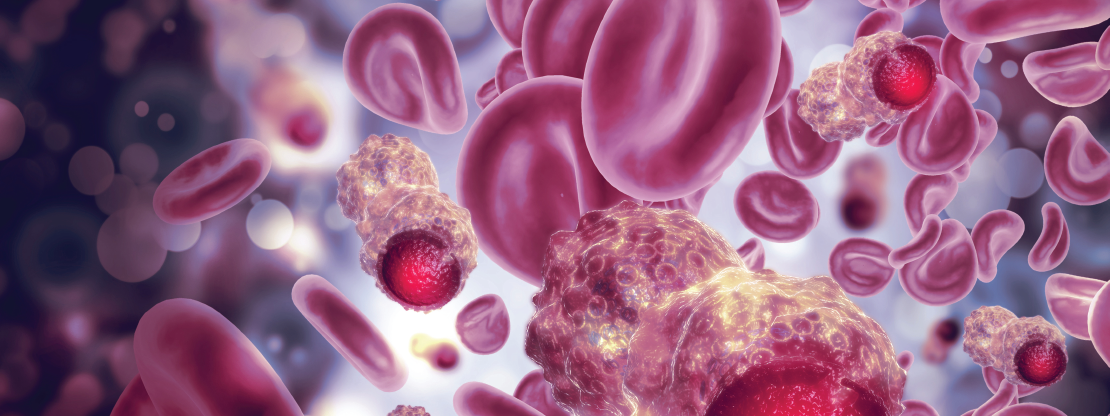Combining two cancer medications may increase survival in relapsed myelodysplastic syndrome, lays groundwork for future cancer therapies
November 1, 2022

GRAND RAPIDS, Mich. (Nov. 1, 2022) — A pair of cancer medications that act as a one-two punch against malignant cells demonstrated increased survival in patients with relapsed/refractory myelodysplastic syndrome (MDS) by an average of 10 months compared to historical controls, according to results from a phase 1/2 clinical trial published in Clinical Cancer Research.
In addition to improving overall average survival from five to 15 months, the trial findings also suggest the effectiveness of combining medications that target both the immunological and epigenetic drivers of cancers.
The trial was supported by the Van Andel Institute–Stand Up To Cancer Epigenetics Dream Team, a multi-institutional effort to move potential combination cancer treatments into clinical trials. It was led by Casey O’Connell, M.D., of University of Southern California, in collaboration with Maria Baer, M.D., of University of Maryland, and Kirsten Grønbaek, M.D., D.MSc., of University of Copenhagen and Rigshospitalet.
“We are thrilled that administering a medicine to reawaken the immune system may benefit a subgroup of patients with MDS, as this class of drugs is not currently approved for these patients,” O’Connell said. “We are now exploring blood-based markers that identify which patients are most likely to respond in order to design a more personalized treatment approach in a subsequent trial.”
MDS is a type of cancer that occurs when the bone marrow can no longer make healthy blood cells. These sick cells either die early or are identified as a threat by the immune system and killed, leaving the body without enough healthy blood cells to properly function. About a third of people with MDS can progress to a more severe and tough-to-treat type of blood cancer called acute myeloid leukemia.
Approximately half of people with MDS respond when treated with a type of epigenetic medication called a hypomethylating agent, which works by correcting errors in how the instructions in DNA are used. Unfortunately, responses to these agents are not long-lasting. There are limited treatment options for people whose MDS returns after their initial course of treatment.
To address this, the investigators paired a novel hypomethylating agent with a type of immunotherapy called a PD-L1 inhibitor that helps the body identify and attack cancer cells. Survival among treated patients appears to be longer than what has been previously reported for this patient population; this study lays some groundwork for future studies that pair epigenetic and immunotherapies to treat cancer.
In total, 33 patients were enrolled in the study, 30 of whom had MDS. Three participants had chronic myelomonocytic leukemia (CMML), a type of blood cancer closely related to MDS.
“As this trial indicates, combining cancer therapies has the potential to improve survival and make a real difference for people with cancer by allowing us to target multiple vulnerabilities in cancer at once. These findings represent an important proof-of-concept that should inform future research toward the next generation of cancer treatment,” said VAI Chief Scientific Officer Peter A. Jones, Ph.D., D.Sc. (hon). Jones co-leads the VAI–SU2C Epigenetics Dream Team with Stephen B. Baylin, M.D., of Johns Hopkins University and VAI.
The trial is one of 14 launched by the VAI–SU2C Epigenetics Dream Team since its inception in 2014.
Other study authors include Andreas Due Ørskov and Jacob Werner Hansen of University of Copenhagen and Rigshospitalet; Sunil Kumar Saini, Steffan Holmberg-Thyden and Sine Reker Hadrup of the Technical University of Denmark; Vu H. Duong and Ashkan Emadi of University of Maryland; Patricia Kropf of Fox Chase Cancer Center; Denice Tsao-Wei, Kristin Harwood and Imran Siddiqi of University of Southern California; Hyo Sik (Josh) Jang, Ryan Burgos and Galen Hostetter of Van Andel Institute; Jack Cowland of Rigshospitalet; Brett T. Brinker of Cancer and Hematology Centers of West Michigan; Benjamin A. Youngblood of St. Jude Children’s Research Hospital; and Jean-Pierre Issa of Coriell Institute for Medical Research.
The research team is immensely grateful to the trial participants and their families without whom these findings would not be possible.
Research funding for this work was provided by Van Andel Institute through the Van Andel Institute–Stand Up To Cancer Epigenetics Dream Team. Stand Up To Cancer is a division of the Entertainment Industry Foundation. The clinicialtrials.gov identifier for this trial is: NCT02935361.
